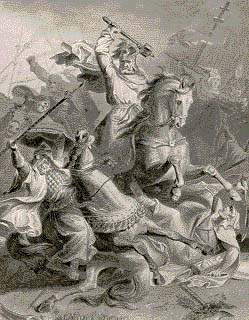skip to main |
skip to sidebar
 They could use him now.
They could use him now.The most important of his wars was one with the Saracens, who came across the Pyrenees from Spain and invaded the land of the Franks, intending to establish Mohammedanism there. Their army was led by Abd-er-Rahman (Abd-er-Rah’-man), the Saracen governor of Spain.
On his march through the southern districts of the land of the Franks Abd-er-Rahman destroyed many towns and villages, killed a number of the people, and seized all the property he could carry off. He plundered the city of Bordeaux (bor-do’), and, it is said, obtained so many valuable things that every soldier “was loaded with golden vases and cups and emeralds and other precious stones.”
But meanwhile Charles Martel was not idle. As quickly as he could he got together a great army of Franks and Germans and marched against the Saracens. The two armies met between the cities of Tours and Poitiers (pwaw-te-ay) in October, 732. For six days there was nothing but an occasional skirmish between small parties from both sides; but on the seventh day a great battle took place.
Both Christians and Mohammedans fought with terrible earnestness. The fight went on all day, and the field was covered with the bodies of the slain. But towards evening, during a resolute charge made by the Franks, Abd-er-Rahman was killed. Then the Saracens gradually retired to their camp.
It was not yet known, however, which side had won; and the Franks expected that the fight would be renewed in the morning.
But when Charles Martel, with his Christian warriors, appeared on the field at sunrise there was no enemy to fight. The Mohammedans had fled in the silence and darkness of the night and had left behind them all their valuable spoils. There was now no doubt which side had won.
The battle of Tours, or Poitiers, as it should be called, is regarded as one of the decisive battles of the world. It decided that Christians, and not Moslems, should be the ruling power in Europe.
Charles Martel is especially celebrated as the hero of this battle. It is said that the name MARTEL was given to him because of his bravery during the fight. Marteau (mar-to’) is the French word for hammer, and one of the old French historians says that as a hammer breaks and crushes iron and steel, so Charles broke and crushed the power of his enemies in the battle of Tours.
But though the Saracens fled from the battlefield of Tours, they did not leave the land of the Franks; and Charles had to fight other battles with them, before they were finally defeated. At last, however, he drove them across the Pyrenees, and they never again attempted to invade Frankland.
That morning was 11 OCT 732, the day after the decisive 10 OCT battle. What was France up to prior to Charles?After the death of Mohammed the Saracens, as Mohammedans are also called, became great warriors. They conquered many countries and established the Mohammedan religion in them. In 711 the Saracens invaded and conquered a great part of Spain and founded a powerful kingdom there, which lasted about seven hundred years.
They intended to conquer the land of the Franks next, and then all Europe.
They thought it would be easy to conquer the Franks, because the Frankish king at that time was a very weak man. He was one of a number of kings who were called the “Do-nothings.” They reigned from about 638 to 751. They spent all their time in amusements and pleasures, leaving the affairs of the government to be managed by persons called MAYORS OF THE PALACE.
Charles was one of the Mayors.
 They could use him now.
They could use him now.








No comments:
Post a Comment